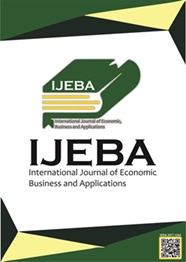The Competency of Teacher Entrepreneurship in Teaching
Abstract
Teacher entrepreneurship competence in teaching is a teacher's proficiency to integrate entrepreneurial values when teaching for all subjects, which is measured independently, creative, risk-taking, leadership, action-oriented, and hard work.This study focuses on finding out how high the level of competence of teacher entrepreneurship in teaching, and how big the contribution of each indicator to the variables. The study population was 71 teachers, and the entire population was sampled. Data was collected using questionnaires and was analyzed with descriptive and inferential statistics. The results showed that the competence of teacher entrepreneurship in teaching based on six indicators was obtained with very high interpretation, with value of Mean 4.08 and Standard Deviation 0.83. The contribution of indicator to the variables is classified as lower interpretation (33.36%). The role of teachers in applying the value of entrepreneurship to students must be inderecting on every subject or subject matter when the implementation of learning in the classroom or outdoor. Teachers are expected to have entrepreneurial competence as part of their professional accountability.
Keywords
Full Text:
PDFReferences
Abas Sunarya. 2011. Kewirausahaan. Andi. Yogyakarta.
Agus Wibowo. 2011. Pendidikan Kewirausahaan (Konsep dan Strategi). Yogyakarta: Pustaka
Pelajar.
Allen. 2010. Using the social entrepreneurship approach to generate innovative and sustainable malaria diagnosis interventions in Tanzania: a case study. Malaria Journal, 942): 1-9.
Ari dan Dedi. 2011. Menjadi Wirausaha Sukses. PT Remaja Rosdakarya. Jakarta.Barlow. Daniel L. 1985. Psychology: The Teaching Learning Process. Published by. Moody Publishers.
Audretsch, D.B. 2007. The entrepreneurial society. Oxford: Oxford
University Press.
Baron, RC. 2004. Pioneers and plodders: The American entrepreneurial spirit. Golden, CO: Fulcrum Pub., 346 p.
Baum, J. Locke, E. 2004. The relationship of entrepreneurial traits, skills, and motivation to subsequent venture growth. Journal of Applied Psychology, 89 4) 587598.
Brockhaus, R.H. 2001. Entrepreneurship education- a global view. Burlington, USA : Ashgate
Publishing Limited.
Buchari Alma. 2008. Kewirausahaan Untuk Mahasiswa Dan Umum.
Alfabeta. Bandung.
Casson, M. 2005. Entrepreneurship and the theory of the firm. Journal of Economic Behavior &
Organization, 58 2):327-348.
Ciputra. 2008. Entrepreneurship mengubah masa depan bangsa dan masa depan anda. Jakarta: Elexmedia Komutindo.
Daeng Ayub Natuna, 2017. Karakter Kewirausahaan Kepala Sekolah di Kecamatan Mempura, Siak. Pekanbaru: LP2M Universitas
Riau.
Daeng Ayub Natuna. 2016. Kontribusi Akuntabilitas Guru dalam
Pelaksanaan
Pembelajaran Terhadap
Penerapan Nilai Kewirausahaan di SMA Negeri Tambang, Kabupaten Kampar. Pekanbaru: LP2M Universitas Riau.
Davidsson, P. 2008. The entrepreneurship research challenge. UK: Edward Elgar, Cheltenham.
Departemen Pendidikan Nasional. 2005. Undang-Undang Guru dan Dosen. Jakarta: Depdiknas.
Endang dan Made. 2011. Kewirausahaan di SMK. Sekarmita. Jakarta.
Fillis, I. 2006. A biographical approach to researching entrepreneurship in the smaller firm. Management Decision, Vol. 44, N. 2, 198-212.
Frederick, HH, & Kuratko DF. 2010. Entrepreneurship: Theory, Process and Practice. Cengage Learning, 2nd Asia-Facific
Edition.
Gibb, A. 2006. Towards the entrepreneurial Universityentrepreneurship education as a lever for change. [cited 2010 12.3.]; http://www.ncge. com/ uploads/ Exec.Summary-
AllanGibb.pdf.
Gustafsson, V. 2004. Entrepreneurial decision-making: Individuals, tasks and cognitions. Jönköping International Business School JIBS. Dissertation Series, Jönköping, Sweden.
Hamdani. 2010. Strategi Belajar Mengajar. Bandung: Pustaka Setia.
Hanushek, E., & Woessmann, L. 2007. The Role of Education Quality for
Economic Growth. Policy Research Working Paper 4122, World Bank, Washington, DC.
Hendro. 2005. How To Be A Smart Entrepreneur And To Start New Business. Yogyakarta: Andi
Offset.
Hendro. 2011. Dasar-Dasar
Kewirausahaan. Erlangga Jakarta. Hisrich dan Peters.1992. Entrepreneurship. Tokyo: Toppan, Co, LTD.
Jackson, W.T. & Vaughan, M.J. 2004. The entrepreneurial continuum: A prescription for future studies. Forthcoming in Academy of Entrepreneurship Proceedings, Allied Academies: Cullowhee, NC.
Johar Permana dan Darma Kesuma.2011. Pendidikan Karakter-Kajian Teori dan Praktek Disekolah. Bandung:
PT Remaja Rosda Karya.
Kariman.2002. Strategi Pembelajaran Abad 21. Jakarta: Hotel Indonesia.
Martaja.2009. Kaderisasi Wirausahawan Sejak Dini. http://www.hupelita.
com/baca.php?id=52148.
Meredith, Geoffrey G. et. Al. 2007. Kewirausahaan, Teori dan Praktek. Jakarta: PT. Pustaka Binaman Pressindo.
Moh.Uzer Usman. 2001. Menjadi Guru Professional. Bandung: Remaja Rosdaakarya.
Muhibbin Syah, 1995. Psikologi Pendidikan Suatu Pendekatan Baru. Bandung : Remaja Rosdakarya.
Mulyasa. 2007. Menjadi kepala sekolah profesional. Bandung: Remaja Rosda Karya.
Nor Aishah Buang. 2006. Asas keusahawanan. Selangor Darul Ehsan: Fajar Bakti Sdn. Bhd.
Nor Aishah dan Isteti. 2006. PrinsipPrinsip Kewirausahaan. Fakuliti
Pendidikan Universiti Kebangsaan Malaysia. Sumatera Barat.
Nor Aishah dan Isteti. 2006. PrinsipPrinsip Kewirausahaan. Fakuliti
Pendidikan Universiti Kebangsaan Malaysia. Sumatera Barat.
O’Connor, E., & Fiol, M. 2006. Focusing Your People: The Power of Entrepreneurial Thinking. The Physician Executive. 18-23.
Peterman, N.E. & Kennedy, J. 2003. Enterprise education: influencing students. perceptions of entrepreneurship. Entrepreneurship Theory and
Practice 282), 129-144.
Puskur. 2010. Pengembangan Pendidikan Budaya dan Karakter Bangsa: Pedoman Sekolah. Jakarta:
Kemdiknas Balitbang Puskur.
Rhenald Kasali. 2010. Manajemen Periklanan: Konsep dan
Aplikasinya di Indonesia. Jakarta:
Pustaka Utama Grafiti.
Rye, David E. 1996, Tools for Executive: The Vest-Poket Entrepreneur, Alih Bahasa: Hadyana, Buku Pertama, Jakarta: Prenhallindo.
Sony Warsono. 2010. Prinsip-prinsip Akuntansi. Jakarta: Asghard.
Chapter.
Steinhoff, Dun, John F. Burgess. 1993.
Small Business Management Fundamentals 6th. ed. New York:
Mcgraw Hill, Inc
Suarman dan Daeng Ayub Natuna. 2017. Karakter Kewirausahaan Guruguru di Kecamatan Tambang. Pekanbaru. Jurnal PEKBIS. Vol 9, No.1 Maret 2017. p.11-17.
Sugiyono. 2014. Metode Penelitian Pendidikan: Pendekatan Kuantitatif, Kualitatif, dan R&D.
Alfabeta. Bandung.
Suharsimi Arikunto. 2010. Prosedur Penelitian Suatu Pendekatan
Praktek. Rineka Cipta. Jakarta.
Suryana.2006. Kewirausahaan. Salemba Empat. Jakarta.
Suryosubroto. 2002. Proses Belajar Mengajar Di Sekolah. Jakarta:
Rineka Cipta.
Suyanto dan Abbas M.S. 2004. Wajah dan Dinamika Pendidikan Anak
Bangsa. Jakarta : Adicita Karya
Nusa
Syaiful Bahri Djamarah. 2002 . Psikologi Belajar. Jakarta: PT. Rineka Cipta:
Syaiful Sagala. 2003. Administrasi pendidikan kontemporer.
Bandung; Alfabeta.
Toto Dianto.2011. Mewujudkan Sekolah yang Unggul Melalui Manajemen
Berbasis Sekolah yang Transformatif, Antisipatif, dan Adaptif. http://totodianto. staffsite.uniku.ac.id/ category/artikel/Desember, 2011.
Tutik Susilowati .2013.Pengembangan Pendidikan Kewirausahaan dalam Upaya Menumbuhkan Budaya Wirausaha Pada Siswa Sekolah Menengah Atas (SMA) di Kabupaten Karanganyer. 52JKB No. 12. Th.VII. Januari 2013.
Yuyun Wirasasmita. 1999.
Kewirausahaan: buku pegangan. Jatinangor: UPT-Penerbitan IKOPIN.
Yuyus dan Kartib. 2010.Kewirausahaan Pendekatan Karakteristik Wirausahaan Sukses. Kencana. Bandung.
Zimmer, W.T. and Scarborough, N. 2008. Kewirausahaan Dan Manajemen Usaha Kecil. Salemba Empat.
Jakarta.
DOI: http://dx.doi.org/10.31258/ijeba.2.1.41-52
Refbacks
- There are currently no refbacks.





.png)
.png)
.png)


